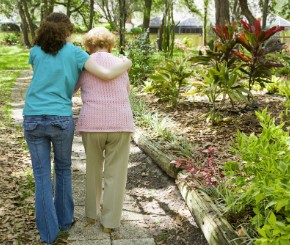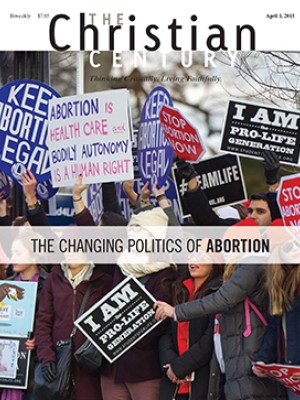Dementia and resurrection

Our culture’s judgment on dementia comes down to three words. The first is deficit. No one has a positive association or reaction in relation to dementia. It’s all subtraction from regular life, all taking away, all negative. There’s nothing good to say about it. It’s a curse from a wicked fairy, and there’s no magic wand to wave it away.
The second word is decline. For dementia the arrow only goes one way, from bad to worse. There are no recovery stories, no websites with breakthrough diets or amazing parent turnarounds. It never gets better. It just goes downhill. It’s a story of decline.
Read our latest issue or browse back issues.
The third word, the one lurking in the back of every conversation about dementia, is death. Our society looks on dementia as a living death. Facing up to dementia as the sufferer or the patient is like grieving a bereavement. I’ve presided at funerals many times for those who’ve spent the last chapter of their life living with dementia. It’s as if the family members have faced two losses. Often they’re very confused about whether this second occasion is a release, because the dementia has seemed like a prison, and any way out of the prison, even death, must be a release. And it’s not always clear if the release is for the sufferer or for the family.
Deficit, decline, and death sum up our culture’s attitude to dementia. When a person and a family receive a diagnosis, that’s what they’re facing. Half the people in the world over 85 have some kind of dementia, so it’s very common, yet it’s become the repository for our society’s deepest fears. In the light of these associations it’s not surprising that the reflex is to hold tight, to try and avoid decline, to pull back from the abyss of deficit and death. It’s an understandable reaction. Dementia seems to rid a person of everything that’s of value: one’s past, through the loss of memory; one’s relationships, through the blurring of recognition; and one’s dignity, through the diminishment of sense of self and self-care. Holding on through a struggle for memory often results in conflict, and for the caregiver it often results in exhaustion and guilt (the lack of progress seems to require someone to be to blame).
I’ve found some insight into all of this in the first Greek word that I learned, the first-person verb luo. I quickly discovered that it means “I loose”—it’s a particularly useful verb for those who’re in the habit of tying up oxen or releasing mules.
But then comes the great day when you first pick up a copy of the New Testament in its original Greek. And then you enter a new world. You read the end of the raising of Lazarus story, and, as Lazarus comes out of the tomb, Jesus says, “Unbind him and let him go.” Here the word luo means “unbind him’” (turns out it’s useful for more than oxen). You read the sonorous words of Ephesians, “He has broken down the dividing wall of hostility,” and discover that the word for “broken down” is our little friend luo. You look at the description of Jesus in the book of Revelation and read, “Him who loves us and freed us from our sins by his blood.” There’s luo again, busily freeing us from our sins.
Little luo makes an appearance at these and plenty of other moments in the New Testament. What all these moments have in common is that each one of them paints a picture of resurrection. Resurrection is the defeat of death, the reconciling of hostile parties, the raising from the tomb, the healing of the sick, the restoration of the outcast, and the forgiveness of sins. Luo starts off meaning loosing donkeys but ends up meaning all of these things.
I think luo has something important to teach us in the face of dementia. In the face of deficit, decline, and death we try hard to cling on. But the lesson of the little word luo is that maybe the path of resurrection lies in letting go. If death is starting now, maybe resurrection can start now too.
Perhaps it’s only when we let go of who and what our loved one was that we can receive who they are now. Perhaps only when we find ways to enjoy who they are now can we reverse the deficit and the decline, because we stop assuming they’re moving away from something good and start appreciating that they’re moving into something new.
Dementia is not a living death. It’s an invitation to see how we can remain the same person yet take on new and rather different characteristics. In that sense it’s a training in resurrection, in which we shall be changed but still recognizably ourselves. Like resurrection, we can’t experience it unless we find ways to let go, to let loose, to be released and forgiven. God welcomes us into eternal life not by keeping a tight hold on us but by letting us go. The challenge for us in dementia is to find ways that we can do the same.






